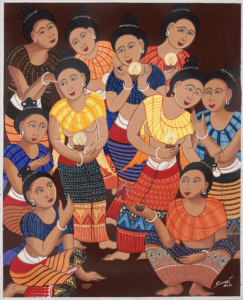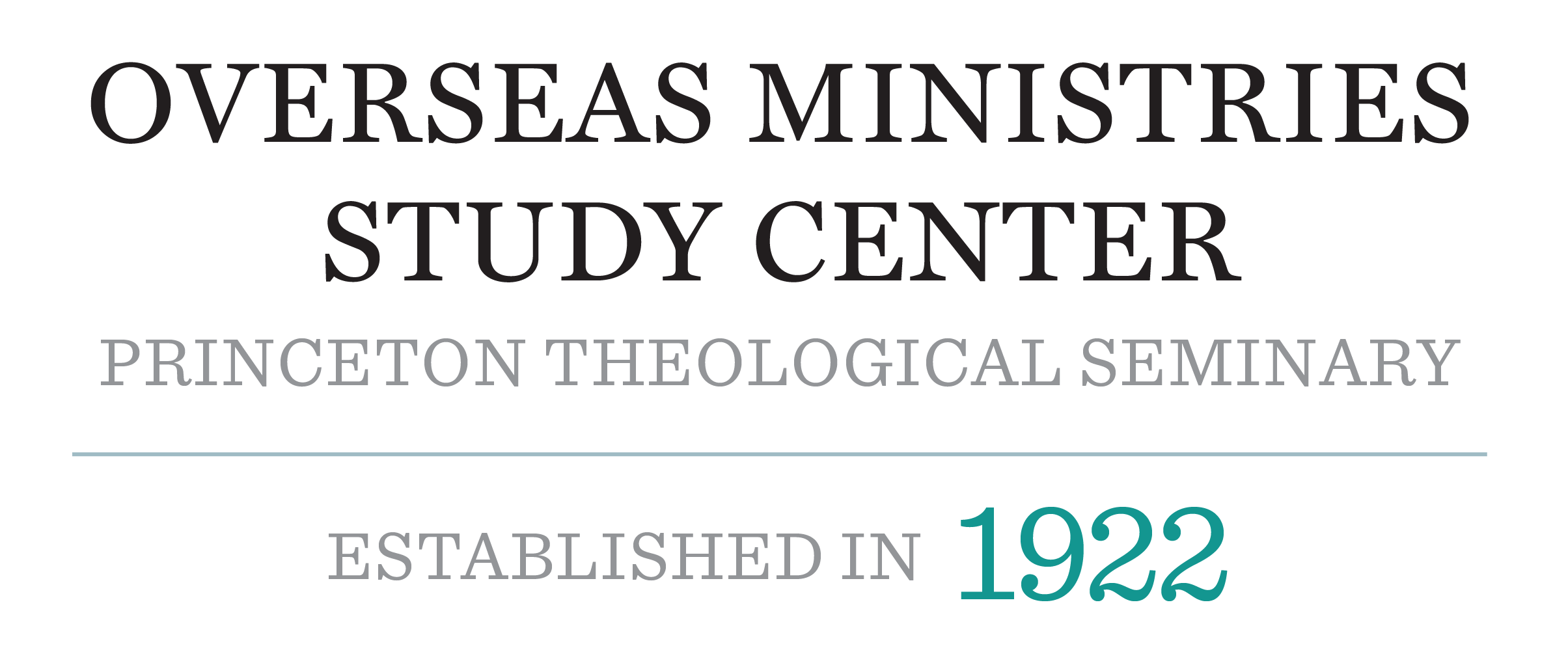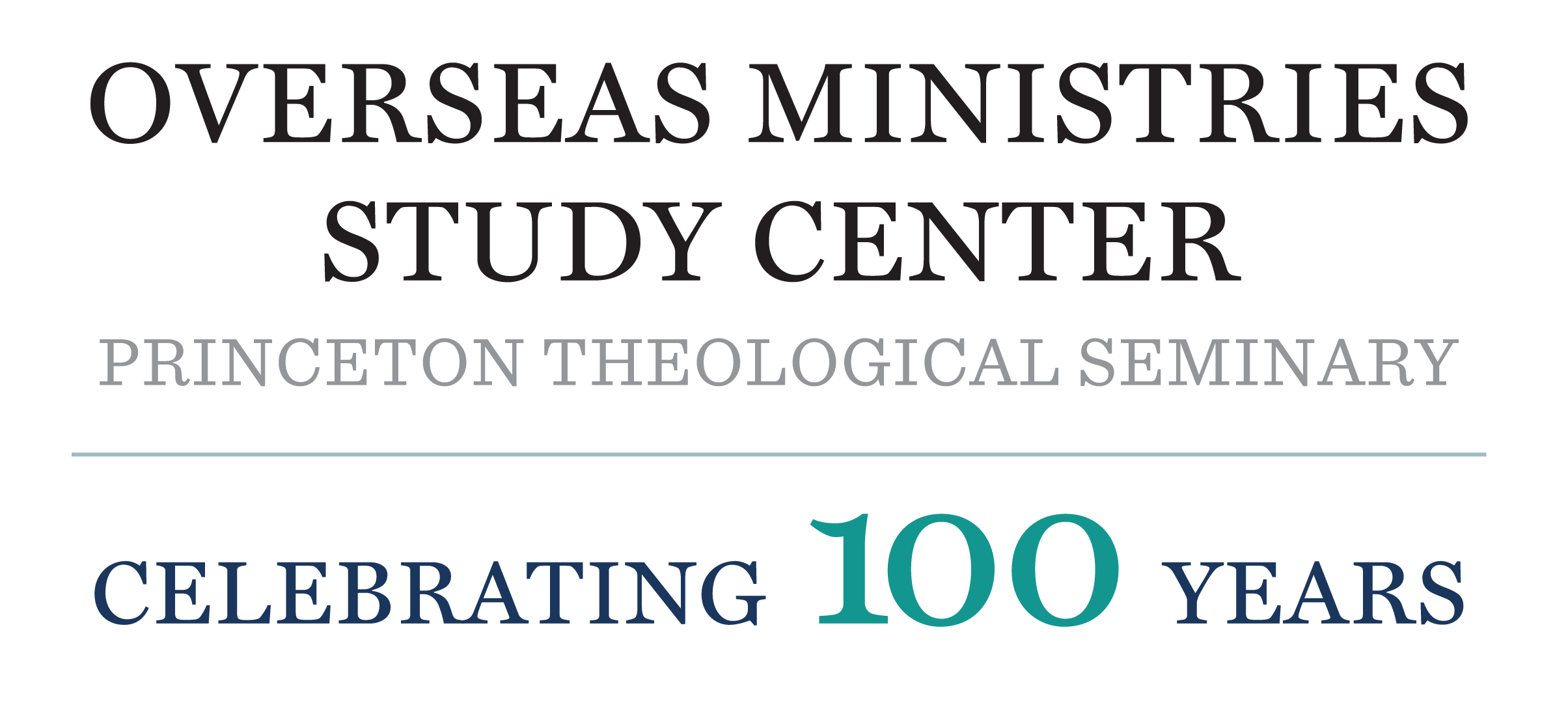By Thomas Hastings – Executive Director – OMSC@PTS
This is the second in a series of eight posts that spotlights paintings from our Artist in Residence program in dialogue with Christian scripture to offer spiritual windows for reflection and prayer. These reflections are based on Princeton Seminary’s Summer 2022 Chapel series. You can view the service from which this post is based HERE
SCRIPTURE READING: Matt. 25:1-13
This is a second painting by Sawai Chinnawong, this one on the parable of The Ten Bridesmaids. As with last week’s painting on the Creation story in Genesis, this parable from Matthew is depicted within a Thai cultural setting. Sawai says, “These bridesmaids wear the traditional sabai over their shoulders, a type of plain cloth common among women in northern Thailand and among our neighbors in Burma.”
The setting for this parable follows a private sermon Jesus delivers to his disciples at the Mount of Olives (24:3). There he describes the end of the age, when there will be wars and persecutions, sacrilege and false messiahs, the heavens and earth shaken, and the Son of Man coming in glory (24:4–31), and though the end of the age and these calamities will come soon, nobody knows when they will come (24:32–44). The moral force of the sermon then turns on a series of stories about how to live until the end of the age, and the parable of the Wise and Foolish Bridesmaids is the second of these stories.
If we follow the logic of the parable, Jesus seems to be admonishing us to “stay alert, wait purposefully, be prepared.” In all honesty, I have never really liked this parable, because all the readings I have heard since my youth have focused on our faithfulness as individuals. But what kind of heroic individual is ever adequately prepared for the traumatic calamities that will attend the end of the age? And if we focus on what we must do to endure till the end, what happens to the all-sufficient saving grace of God?
Sawai’s Ten Bridesmaids (Matt 25) suggests the possibility of a different reading and a different outcome to this parable.
Notice that the moment of the parable he focuses on is on the trimming of the lamps in verses 5–9:

Matt. 25:5 As the bridegroom was delayed, all of them became drowsy and slept.
Matt. 25:6 But at midnight there was a shout, ‘Look! Here is the bridegroom! Come out to meet him.’
Matt. 25:7 Then all those bridesmaids got up and trimmed their lamps.
Matt. 25:8 The foolish said to the wise, ‘Give us some of your oil, for our lamps are going out.’
Matt. 25:9 But the wise replied, ‘No! there will not be enough for you and for us; you had better go to the dealers and buy some for yourselves.’
Note well that the wise and the foolish fall asleep! So much for the admonition to superhuman vigilance!
Here is where the artist, nurtured in a culture where identity is centered in the community rather than the individual, takes some artistic license by pondering the fateful judgment of the wise bridesmaids who say in response to the request of the foolish bridesmaids, “. . . there will not be enough for you and for us,” and then they send them away on a last-minute shopping trip that makes them late for the wedding banquet. But what if the judgment of the wise bridesmaids is faulty? Might the light of the five be adequate for all ten to gain entrance to the banquet?
Look at how Sawai has depicted the mouths of these ten bridesmaids. The mouths of the wise are turned up in a smile. Is it a smile of joy or of self-satisfaction? And their bodily gestures indicate they are guarding the light of their lamps. By contrast, the mouths of the foolish, with only one exception, are flat. Now focus in on this pair on the right. Even though the wise one has extended her left hand in an initial gesture of denial, is she not now leaning in to the request of her friend? And isn’t this foolish bridesmaid breaking out in a smile, indicating the possibility that the light may be shared rather than hoarded?
Might the parable be open to interpretations we who live in a highly individualistic culture may have missed? Having lived in Japan for 23 years, I can say with confidence that the idea of not sharing something of such value with one’s peers, friends, or family is really unthinkable.
I’ll never forget one of my Japanese seminarians saying she did not want to go to heaven if God were to deny entrance to her Buddhist parents.
So, given the radical logic of the Gospel of grace and in the face of war, persecution, sacrilege, false messiahs, the shaking of heaven and earth, and the coming of the Son of Man, might the so-called “wise” ones bear some sacred responsibility for sharing what they have with the so-called “foolish ones”? I wonder. . . What do you think?
Let us pray this prayer of the Rev. Martin Luther King Jr.:
Ever present God, you called us to be in relationship with one another and promised to dwell wherever two or three are gathered. In our community, we are many different people; we come from many different places, have many different cultures. Open our hearts that we may be bold in finding the riches of inclusion and the treasures of diversity among us. We pray in faith. Amen.




